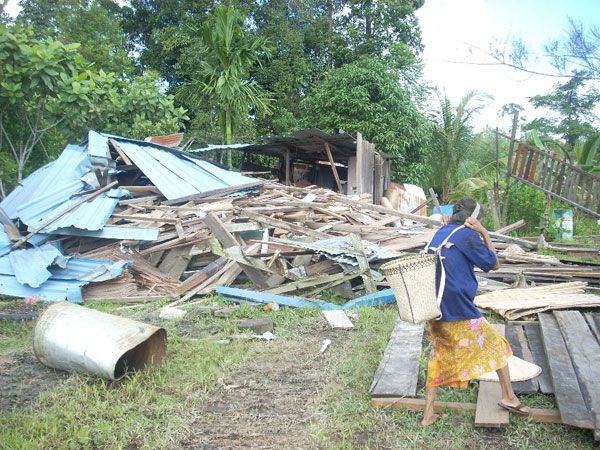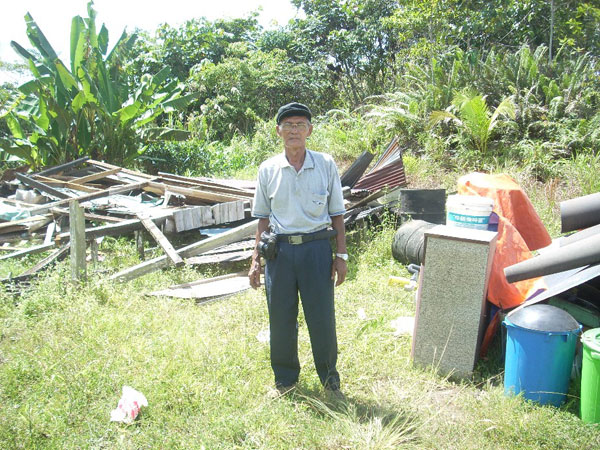A court in the Malaysian state of Sarawak has issued an injunction to block the continued destruction of the Iban village of Sungai Sekabai, reports the Bruno Manser Fund (BMF), an indigenous rights groups.
Last week Sarawak state police demolished 39 Iban homes in a dramatic escalation of dispute between the community and a state-backed land developer, Tatau Land Sdn Bhf, which is owned by a holding company controlled by Sarawak’s Chief Minister Taib Mahmud, according to the local news service, Bintulu.Org. Authorities said they were serving an eviction order, but a lawyer for the Iban said the order was under appeal. The homes were destroyed without prior notice.
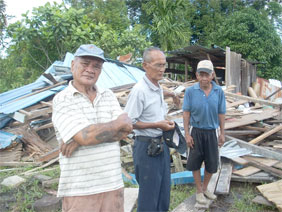 Iban natives of Sungai Sekabai are shocked after the destruction of their village by the Malaysian authorities; in the center headman Nor anak Nyaway. |
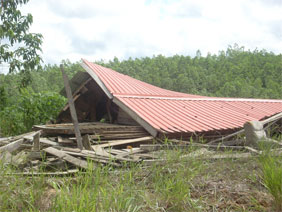 Destroyed house at the Iban village of Sungai Sekabai. Pictures © BMF / TAHABAS |
One of the destroyed homes belonged to Nor Nyawai, a community leader in Sungai Sekabai who famously won a court case in 2001 which recognized native rights over primary rainforest.
“In a 2001 landmark court ruling, the High Court of Sabah and Sarawak acknowledged that the Iban community under Nor had native customary rights not only over their farmland but also over primary rainforests,” said BMF in a statement.
But while the ruling set a precedent that strengthened native claims to customary lands in Sarawak, the community of Sungai Sekabai has been battling developers ever since. A timber company at the root of the dispute has cleared much of the forest around the community, replacing it with acacia plantations, despite the 2001 court decision.
The new injunction will put a halt to demolition of Iban homes until a trial is held on the community’s pending court case on February 9. A non-profit, Berkeley-based The Borneo Project, is raising money to provide emergency funding for the community and legal support for the case.
The Sarawak state government has long backed industrial interests over those of native peoples like the Penan and Iban, both investing in projects — including oil palm plantations, mines, hydroelectric projects, and logging operations — and sending in the military and police to crush local opposition. Its newest scheme is known as SCORE, a set of projects that will turn a large swathe of Sarawak into an industrial corridor for mining and energy development. SCORE includes at least four hydroelectric dams (up to 28,000MW of power), aluminum-smelting and steel plants, coal mines (1.46 billion metric tons), and natural gas development (nearly 41 billion cubic feet), according the state government, which is trying to attract investment at a time when investors (domestic and foreign) are fleeing Malaysia due to concerns over corruption and political unrest.
Environmentalists say the projects will displace indigenous groups and destroy important ecosystems, endangered biodiversity and contributing to Malaysia’s surging greenhouse gas emissions.
Related articles
Malaysia and China agree to $11 billion deal to build mines, dams in Borneo
(01/13/2010) Malaysia and China today agreed to am $11 billion deal that will turn a vast area of Sarawak, a Malaysian state in northern Borneo, into an industrial corridor for mining and energy development, reports The Financial Times.

(12/22/2009) In James Cameron’s newest film Avatar an alien tribe on a distant planet fights to save their forest home from human invaders bent on mining the planet. The mining company has brought in ex-marines for ‘security’ and will stop at nothing, not even genocide, to secure profits for its shareholders. While Cameron’s film takes place on a planet sporting six-legged rhinos and massive flying lizards, the struggle between corporations and indigenous people is hardly science fiction.
Malaysia to allow logging in indigenous ‘peace park’ to proceed
(12/17/2009) Malaysia, the country with the fastest rate of greenhouse gas emissions growth since 1990 among middle and upper income countries, will allow logging to proceed in a contested rainforest area in Sarawak, on the island of Borneo.
Rainforest tribe sues the Malaysian government for enabling deforestation
(12/10/2009) Five Penan rainforest communities are suing the Sarawak state government and the Malaysian timber giant Samling for violation of their native customary rights, reports the Bruno Manser Fund, a group that works on behalf of indigenous groups in Malaysia.
Power, profit, and pollution: dams and the uncertain future of Sarawak
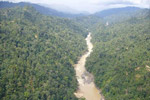
(09/03/2009) Sarawak, land of mystery, legend, and remote upriver tribes. Paradise of lush rainforest and colossal bat-filled caves. Home to unique and bizarre wildlife including flying lemurs, bearcats, orang-utans and rat-eating plants. Center of heavy industry and powerhouse of Southeast Asia. Come again? This jarring image could be the future of Sarawak, a Malaysian state on the island of Borneo, should government plans for a complex of massive hydroelectric dams comes to fruition. The plan, which calls for a network of 12 hydroelectric dams to be built across Sarawak’s rainforests by 2020, is proceeding despite strong opposition from Sarawak’s citizens, environmental groups, and indigenous human rights organizations. By 2037, as many as 51 dams could be constructed.



